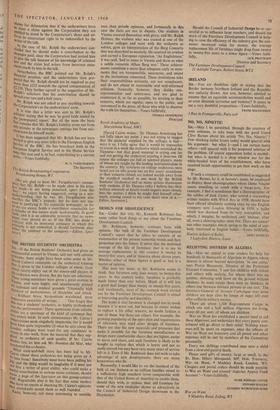the British Students° Orchestra had given an U nsuccessful concert in
Vienna. and met with adverse criticism, there might have been some point in Mr. avid Cairns's comments on the orchestral training (hat is given in the London colleges of music, from :nigh nearly eighty out of the ninety-odd players in the orchestra were drawn. But the facts are otherwise. Vienna, young musicians were given a great ovation in Yienna, and were highly and unanimously praised nn technical and musical grounds. 'Unusually high standard of performance, of discipline and attack.
• • Brilliant brass, harmonious woodwind, most
impressive ensemble of strings. . . ."One forgot that this was a students' orchestra, so highly professional was the performance.' These quotations from reliable critics are a specimen of the kind of comment that Was widely made. In such circumstances Mr. Cairns's have seem singularly inapposite, for it would u,ave been quite impossible (if what he says about the London colleges were true) for any conductor to create in one week, from the material that they sup- TIN, an orchestra of such quality. If Mr. Cairns doubts this, let him ask Mr. Norman del Mar, who conducted the orchestra.
What cock-and-bull story has been fed to Mr.
L. aims about these orchestras not being given an A :° tune from? Somebody must have been pulling his Leg: and the thing would be laughable if it were not sdd that a writer of great ability, who could make a useful contribution to serious music criticism, should waste a page of the Spectator on this gossip-column ,`,Liff. Regrettable also is the fact that some readers who have no means of checking Mr. Cairns's opinions lUaY mistakenly accept them as well founded. Facts, however, are more convincing to sensible
men than private opinions, and fortunately in this case the facts are not in dispute. Our students in Vienna covered themselves with glory; and Mr. Ralph Holmes, the violinist who was trained at one of the London colleges and went with the orchestra as soloist, gave an interpretation of the Berg Concerto that was described as masterly. He received an ovation and earned a European reputation. 'An Englishman,' it was said, 'had to come to Vienna and show us what a subtle romantic Alban Berg was.' These achieve- ments constitute a more than adequate reply to state- ments that are irresponsible, inaccurate, and unjust to the institutions concerned. These institutions take their responsibilities seriously, are not complacent, and do not object to reasonable and well-informed criticism. Naturally, however, they dislike mis- representation and unfairness, and are glad to counteract it, so far as possible, by inviting to their concerts, which are regular, open to the public, and announced in the press, all those who wish to discover the truth for themselves.--Yours faithfully, THOMAS ARMSTRONG Principal Royal Academy of Music, Marylebone Road, NW I [David Cairns writes: 'Sir Thomas Armstrong has not fully taken my point. I was not trying to suggest that the material supplied by the colleges is bad— were it so, I fully agree that it would be impossible to create in a week the orchestra which astonished the Viennese—but that good material is crying out for and not getting the orchestral training it deserves. Of course the colleges are full of talented players, many of whom are taught by the leading instrumentalists in the country. My strictures on college orchestras were based not on idle gossip but on five years' attendance at their concerts (which are indeed worlds away from the standard reached in one week by the British Students' Orchestra) and on many serious discussions with students. if Sir Thomas (who I believe has their welfare sincerely at heart) would inquire more closely into the matter, I think he might find himself reluc- tantly coming round to my (and their) view of it.'— Editor, Spectator.)


































 Previous page
Previous page